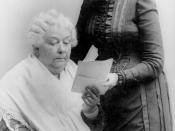Women's Rights and Abolitionism
Elizabeth Cady Stanton, a long-time advocate of women's rights, in a speech to the American Anti-Slavery Society said, "Yes, this is the only organization on God's footstool where the humanity of women is recognized, and these are the only men who have ever echoed back her cries for justice and equality..." The American Women's Rights movement was very much a product of the fight for abolition. Early leaders, such a Stanton, began their struggle for social justice with the cause of the slavery and its already well-established movements. Anti-Slavery organizations provided inspiration, a proven set of tactics, and a form of critical analysis that aided the women as they later set off on their own crusade for civil justice.
Early Anti-Slavery conventions brought together some of the brightest, most eloquent men and women of the time. Together they discussed and debated the basic principles of human rights: justice, liberty and equality for all.
Women, who had long been metaphorically in the same shackles and chains as black slaves saw these conventions as an important building block to their own emancipation. As Emily Collins wrote, "All through the Anti-Slavery struggle, every word of denunciation of the wrongs of the Southern slave, was, I felt, equally applicable to the wrongs of my own sex." However, many clergymen that supported abolition were firmly against women having any part in the struggle and lobbied extensively to have them barred. Stanton points out the ironical situation in saying, "Many a man who advocated equality most eloquently for a Southern plantation, could not tolerate it at his own fireside." This action caused a formal vote to be taken in the Anti-Slavery Society, which by a large majority decreed that women be allowed to take part in the proceedings. Still, the issue of...



Women's Rights and Abolitionism and how did the abolitionist movement aid women's rights advocates in their fight for suffrage?
This essay was very informative for me. I am currently fighting for womans rights, right now in Jackson County Oregon.
0 out of 0 people found this comment useful.